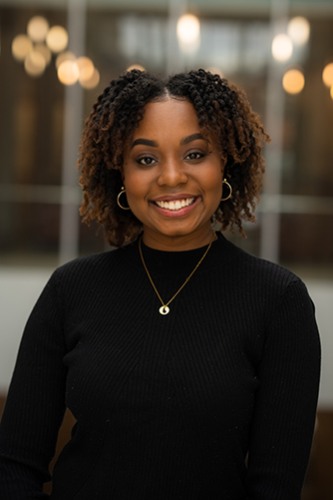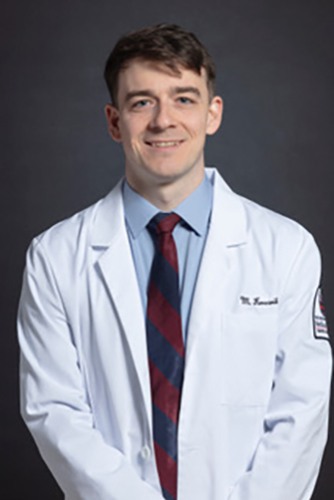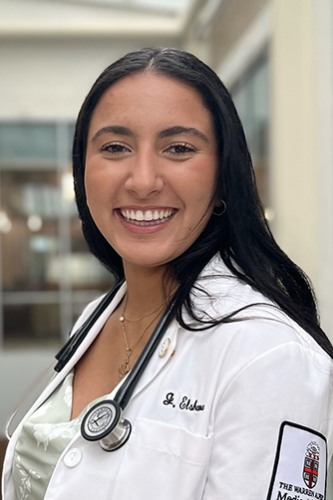Student Stories
Learn about the students who make The Warren Alpert Medical School one of the nation's most renowned institutions.
Breadcrumb
Student Stories
Learn about the students who make The Warren Alpert Medical School one of the nation's most renowned institutions.
-

Kalyn Nix, MS4
Kalyn Nix grew up in Wilmington, DE, with a front-row seat to systemic health care problems, and a resolve to fix them.
“I watched as friends and family in our community suffered and died due to limited access to health care,” Kalyn says. “I decided to pursue a career in medicine and become the first doctor in my family and help make the US health care system more equitable for vulnerable populations.”
After graduating from Princeton University, where she majored in molecular biology and minored in global health and policy, Kalyn took a gap year to work as a medical assistant at a family medicine practice in Philadelphia. She also completed a research project with the Children’s National Medical Center in Washington, DC, on modifying hospital systems to be more accessible to children with autism.
“This experience taught me many fundamental skills about designing a thoughtful intervention, getting community and stakeholder buy-in, and seeing a research project through from conception to publication,” Kalyn says. She’s further honed these abilities at The Warren Alpert Medical School, where as a student in the Caring for Underserved Communities scholarly concentration, she has studied the relationship between social vulnerability and breast and colorectal cancer screening adherence.
Kalyn’s time at Brown has strengthened her commitment to service. She co-led the oncology preclinical elective and the med-peds interest group; served four years on the Medical Student Senate; volunteered with Clínica Esperanza; and was co-president of the Student National Medical Association.
Now a fourth-year student applying to general surgery residency programs—with the ultimate goal of subspecializing in pediatric surgery or surgical oncology—Kalyn still finds time to cook, play volleyball with Brown’s intramural team, go to the beach, and even pick up new hobbies. “I’ve leaned into my artistic side and picked up acrylic and oil painting, as well as customizing sneakers and recently got into refinishing furniture,” she says. -

Matthew Kwasnik, MS3
Matthew Kwasnik followed a winding road to medicine, from the depths of the ocean to The Warren Alpert Medical School. He majored in biology at Villanova University and minored in history, French, honors, and naval science—all on a Navy ROTC scholarship.
Originally, Matthew had planned to study something related to environmental sciences, but changed course after a genetics class in his first semester, during which a friend’s mother died of cancer.
“I felt a sense of urgency to put my classroom introduction to the molecular order underlying human life and disease to a practical end,” Matthew says. “I got a summer cancer research internship the following summer and never looked back.”
After graduation, Matthew completed his service with the Navy: “two years in a nuclear reactor training program followed by three years helping run day-to-day operations onboard nuclear submarines, both in shipyard and at sea.” He then spent a few years traveling before going back to school.
While applying to medical school, he worked as a research technician in a neuroscience lab, gaining essential wet lab experience. He liked Brown for the Medical School’s support structure and the extensive cultural and educational opportunities of the University.
“It seemed like Brown was a place that could support any eventuality that might arise during your time as a medical student. This flexibility made Brown the best choice for me at this point in my life,” he says.
Matthew is a student in the Translational Research in Medicine scholarly concentration; volunteers with the Brown Human Rights Asylum Clinic and the Rhode Island Free Clinic; helped run the Brown Anatomical Society student group; and was a member of Stop the Bleed Rhode Island. While he’s focused on his studies, he occasionally has a few friends over for dinner or a game night.
“Regardless of specialty, I hope to someday emulate the consummate physicians and surgeons at Brown who have taken the time to teach me the art and science of medicine,” he says.
-

Justine Elshama, MS2
Justine Elshama has a unique perspective on the struggles and barriers faced by underrepresented populations. Born and raised in Westford, MA, Justine learned to balance her Egyptian heritage with American culture, and to appreciate how different circumstances shape people’s experiences.
“Growing up, I witnessed the struggles faced by members of my community, from language barriers that limited access to resources to financial challenges that made basic needs difficult to meet. These moments were formative for me, instilling a determination to make systems more accessible and equitable for members of my community,” she says.
While an undergraduate at Boston College, where she studied cognitive neuroscience, Justine worked as a legal assistant at an immigration office. She realized that much of the work was reactive instead of proactive—and observed that the clients’ physicians played important roles in helping and empowering immigrants. They served as clinicians, teachers, and navigators for patients, providing knowledge and connections to resources, and advocating for societal change.
“Learning more about medicine, I found that I was drawn to the combination of healing, teaching, and advocacy that physicians can provide for their patients,” Justine says.
After college, Justine worked in clinical research at Boston’s Children’s Hospital’s critical care department. She says she chose The Warren Alpert Medical School because it cultivates students to be “compassionate changemakers.”
“Being part of a community where service, collaboration, and individuality are celebrated affirmed that Brown was the right place for me to grow into the kind of physician I aspire to be,” she says.
Justine volunteers as a director with Brown Students at the Bedside, which pairs hospital patients who have no visitors with medical students. She’s also a member of the Student Executive Board of the Brown Human Rights Asylum Clinic, where she supports people at the intersection of medicine and law—as she saw physicians do during her time as a legal assistant.
“In many cases, a physician’s written evaluation is the deciding factor in whether a judge grants asylum or refuge, ultimately shaping the course of someone’s life,” she says. “It is a powerful reminder that health care must extend beyond the clinic walls—this work underscores the responsibility of physicians to use their skills and voices to advocate for vulnerable populations.”
Outside of school, Justine used to work during the summer on a farm in her hometown, caring for animals and groundskeeping, and she still loves getting outdoors when she can. “Being outside, wherever I am, is a way for me to recharge,” she says.
-
Brian Vu, MS2
Like many medical students, Brian Vu initially wanted to become a doctor because he loved science. “But I didn’t really figure out my ‘why’ for medicine until I graduated from college and took a couple of years off to work,” he says.
Brian grew up outside of Austin, TX, and graduated from the University of Pennsylvania with a major in biology and minors in chemistry and Asian American studies. He then worked as a civic engagement coordinator and health outreach coordinator for VietLead, a nonprofit that serves Philadelphia’s Southeast Asian community.
“This was where I really found my passion for medicine: being able to utilize my knowledge and experience to uplift underserved communities and equip them with the power to advocate for themselves as patients,” Brian says.
That commitment to advocacy and the community led Brian to The Warren Alpert Medical School, where he feels surrounded by like-minded people. “I really appreciate how intentional the curriculum is in shaping students to recognize their potential as future physicians, not just to drive change within the health care system but also to make an impact on society as a whole,” he says.
As a student in the Primary Care-Population Medicine Program, he’s found the perfect blend of medicine, leadership, and community engagement. For his PC-PM thesis, Brian is visiting local nail salons to understand how their workers connect with the health care system, as well as what may prevent them from doing so. “I come from a Vietnamese American community, and many families around me either owned or worked in nail salons," he says. “This project is my way of advocating for and connecting with my community.”
He’s also serving local senior citizens through Med Wheels, a service organization that he founded at the Medical School, which partners with Meals on Wheels of Rhode Island to provide blood pressure screenings, nutrition workshops, and presentations on older adult health. When Brian has time to spare, he loves to cook—“one of my main love languages,” he says. Whether he’s making Vietnamese dishes to reconnect with his family in Texas or exploring local restaurants with friends, “food for me is a way to deepen relationships and build new ones.”
Learn more
Read more about our students at Medicine@Brown.